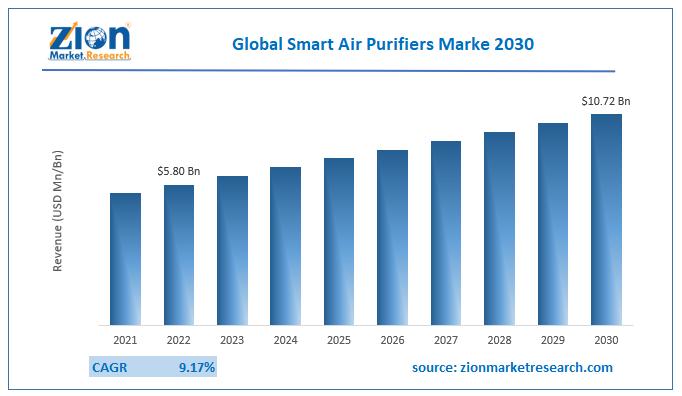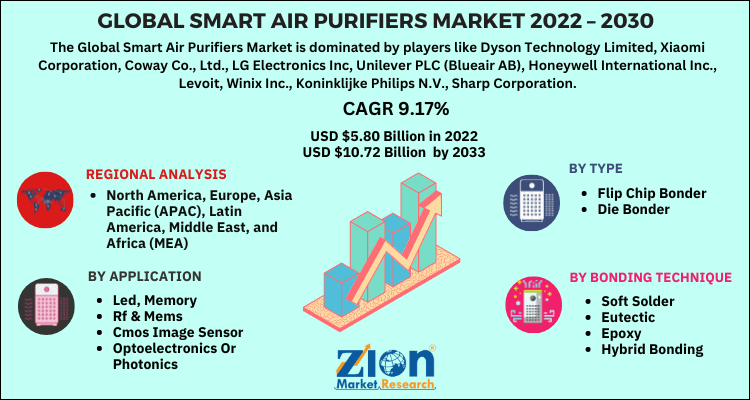Smart Air Purifiers Market Size, Share, Trends, Growth and Forecast 2030

Smart Air Purifiers Market: By Type (Flip Chip Bonder And Die Bonder), By Bonding Technique (Soft Solder, Eutectic, Epoxy, Hybrid Bonding, And Others), By Application (Led, Memory, Rf & Mems, Cmos Image Sensor, Optoelectronics Or Photonics, And Others) And By Region: - Global Industry Analysis, Size, Share, Growth, Trends 2023-2030
| Market Size in 2022 | Market Forecast in 2030 | CAGR (in %) | Base Year |
|---|---|---|---|
| USD 5.80 Billion | USD 10.72 Billion | 9.17% | 2022 |
Description
According to the report published by Zion Market Research, the global Smart Air Purifiers Market size was valued at USD 5.80 Billion in 2022 and is predicted to reach USD 10.72 Billion by the end of 2030. The market is expected to grow with a CAGR of 09.17% during the forecast period.
The report analyzes the global Smart Air Purifiers Market’s growth drivers, restraints, and impact on demand during the forecast period. It will also help navigate and explore the arising opportunities in the Smart Air Purifiers Market Industry.
Global Smart Air Purifiers Market: Overview
Breathing in fresh and clean air has been very essential for health nowadays. The easiest way to take control of the quality of air by banishing pet dander, odor, allergens, and tiny pollutants is with the use of smart air purifiers. The smart air purifier is the best way to cut down on several symptoms such as coughing, sneezing, irritated eyes, headaches, and many more that are been triggered by tiny pollutants. In addition to this, smart air purifiers enable the user to control and keep track of the quality of the air. Such air purifiers make use of filters that remove airborne toxins from the air which may cause health-related issues.
Global Smart Air Purifiers Market: Growth Factors
Rising awareness regarding harmful effects of pollution & airborne diseases, growing preference of the people towards hi-tech lifestyle, and rising disposable income are some of the major factors that are propelling the growth of the global smart air purifiers market. Additionally, some of the smart air purifiers boast intelligent features such as the potential to schedule cleaning days in advance, voice assistant compatibility, and apps that enable the user to monitor levels. Moreover, they are also Bluetooth & Wi-Fi enabled and come with apps to monitor historic and real-time trends, detect toxins, and also send alerts when the level of air quality falls below the safety threshold.
These smart air purifiers can also be monitored remotely and controlled via cloud connections securely. Owing to all these beneficial features, there is a huge demand for smart air purifiers at homes, offices, commercial spaces as well as by allergy sufferers, pet lovers, and people who are sensitive to dirt particles & odors thereby boosting the growth of the global market. In addition to this, the rising trend of smart homes, increasing levels of pollutions, and high investments made by the manufacturers to launch high-end technological advanced products are some of the key factors contributing to the growth of the market.
Furthermore, advancements in currently available techniques such as HEPA and PCO are likely to foster the growth of the global smart air purifiers market during the forecast period. However, the high premium installation and maintenance cost of the smart air purifiers may hinder the growth of the global smart air purifiers market.
Current COVID 19 pandemic situations have a moderate effect on the smart air purifiers market. The production of smart air purifiers got hampered in the first and second quarter of the year 2020, due to strict lockdown and strict regulation on personnel movement all over the world. However, demand for smart air purifiers is increasing at a significant rate as the recent study published by WHO & CDC suggest that chances of COVID 19 infections are more in closed office and commercial spaces. Hence the demand for smart air purifiers is expected to rise in the forecast period.
Global Smart Air Purifiers Market Report Scope:
| Report Attributes | Report Details |
|---|---|
| Report Name | Smart Air Purifiers Market |
| Market Size in 2023 | USD 5.80 Billion |
| Market Forecast in 2030 | USD 10.72 Billion |
| Compound Annual Growth Rate | CAGR of 9.17% |
| Number of Pages | 180 |
| Forecast Units | Value (USD Billion), and Volume (Units) |
| Key Companies Covered | Dyson Technology Limited, Xiaomi Corporation, Coway Co., Ltd., LG Electronics Inc, Unilever PLC (Blueair AB), Honeywell International Inc., Levoit, Winix Inc., Koninklijke Philips N.V., Sharp Corporation |
| Segments Covered | By Type, By Bonding Technique, By Application And By Region |
| Regions Covered | North America, Europe, Asia Pacific (APAC), Latian America, Middle East and Africa (MEA) |
| Countries Covered | North America: U.S and Canada Europe: Germany, Italy, Russia, U.K, Spain, France, Rest of Europe APAC: China, Australia, Japan, India, South Korea, South East Asia, Rest of Asia Pacific Latin America: Brazil, Argentina, Chile The Middle East And Africa: South Africa, GCC, Rest of MEA |
| Base Year | 2022 |
| Historical Year | 2017 to 2021 |
| Forecast Year | 2023 - 2030 |
| Customization Scope | Avail customized purchase options to meet your exact research needs. Request For Customization |
To know more about this report, request a sample copy.
Global Smart Air Purifiers Market: Segmentation
The global smart air purifiers market is bifurcated based on type, bonding technique, application, and region.
Based on the type, the global smart air purifiers market is divided into flip chip bonder and die bonder. Die bonder type is expected to dominate the type segment over the forecast period.
Based on the bonding technique, the global smart air purifiers market is split into soft solder, eutectic, epoxy, hybrid bonding, and others.
The application segment is bifurcated into LED, memory, RF & MEMS, CMOS image sensor, optoelectronics or photonics, and others.
Global Smart Air Purifiers Market: Regional Analysis
North America is estimated to lead the global smart air purifiers market over the forecast period. This is attributed to factors such as the adoption of advanced technologies, the presence of major market players, and high demand from end-users in this region. Europe is expected to be on the second spot in the global smart air purifiers market in terms of revenue. However, Asia Pacific is expected to register the highest CAGR over the forecast period. Factors contributing to the rapid growth of the smart air purifiers market in this region include significant growth in the electronic sector and growing demand for electronic devices in the region especially in India, Japan, and China.
Global Smart Air Purifiers Market: Competitive Players
Some of the key players in the global smart air purifiers market are:
- Dyson Technology Limited
- Xiaomi Corporation, Coway Co., Ltd.
- LG Electronics Inc
- Unilever PLC (Blueair AB)
- Honeywell International Inc.
- Levoit, Winix Inc.
- Koninklijke Philips N.V.
- Sharp Corporation
The Global Smart Air Purifiers Market: Segmentation
By Type:
- Flip Chip Bonder
- Die Bonder
By Bonding Technique:
- Soft Solder
- Eutectic
- Epoxy
- Hybrid Bonding
- Others
By Application:
- Led, Memory
- Rf & Mems
- Cmos Image Sensor
- Optoelectronics Or Photonics
- Others
By Region:
- North America
- The U.S.
- Canada
- Europe
- France
- The UK
- Spain
- Germany
- Italy
- Rest of Europe
- Asia Pacific
- China
- Japan
- India
- South Korea
- Southeast Asia
- Rest of Asia Pacific
- Latin America
- Brazil
- Mexico
- Rest of Latin America
- Middle East & Africa
- GCC
- South Africa
- Rest of Middle East & Africa
What Reports Provides
- Full in-depth analysis of the parent market
- Important changes in market dynamics
- Segmentation details of the market
- Former, on-going, and projected market analysis in terms of volume and value
- Assessment of niche industry developments
- Market share analysis
- Key strategies of major players
- Emerging segments and regional markets
- Testimonials to companies in order to fortify their foothold in the market.
Table Of Content
Choose License Type
List of Contents
Global Smart Air Purifiers OverviewGlobal Smart Air Purifiers Growth FactorsGlobal Smart Air Purifiers Market Report Scope:Global Smart Air Purifiers SegmentationGlobal Smart Air Purifiers Regional AnalysisGlobal Smart Air Purifiers Competitive PlayersThe Global Smart Air Purifiers SegmentationWhat Reports ProvidesFrequentlyAsked Questions
Rising awareness regarding harmful effects of pollution and airborne diseases, growing preference of the people towards hi-tech lifestyle, and rising disposable income are some of the major factors that are propelling the growth of the global smart air purifiers market. Furthermore, advancements in currently available techniques such as HEPA and PCO are likely to foster the growth of the global smart air purifiers market during the forecast period.
Dyson Technology Limited, Xiaomi Corporation, Coway Co., Ltd., LG Electronics Inc, Unilever PLC (Blueair AB), Honeywell International Inc., Levoit, Winix Inc., Koninklijke Philips N.V., and Sharp Corporation are some of the key players in the global smart air purifiers market.
North America is estimated to lead the global smart air purifiers market over the forecast period. This is attributed to factors such as the adoption of advanced technologies, the presence of major market players, and high demand from end-users in this region.
HappyClients
Zion Market Research
Tel: +1 (302) 444-0166
USA/Canada Toll Free No.+1 (855) 465-4651
3rd Floor,
Mrunal Paradise, Opp Maharaja Hotel,
Pimple Gurav, Pune 411061,
Maharashtra, India
Phone No +91 7768 006 007, +91 7768 006 008
US OFFICE NO +1 (302) 444-0166
US/CAN TOLL FREE +1 (855) 465-4651
Email: sales@zionmarketresearch.com
We have secured system to process your transaction.
Our support available to help you 24 hours a day, five days a week.
Monday - Friday: 9AM - 6PM
Saturday - Sunday: Closed







